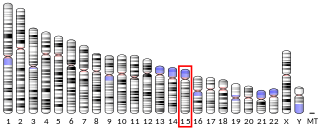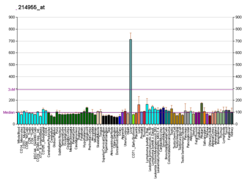
Maspin is a protein that in humans is encoded by the SERPINB5 gene. This protein belongs to the serpin superfamily. SERPINB5 was originally reported to function as a tumor suppressor gene in epithelial cells, suppressing the ability of cancer cells to invade and metastasize to other tissues. Furthermore, and consistent with an important biological function, Maspin knockout mice were reported to be non-viable, dying in early embryogenesis. However, a subsequent study using viral transduction as a method of gene transfer was not able to reproduce the original findings and found no role for maspin in tumour biology. Furthermore, the latter study demonstrated that maspin knockout mice are viable and display no obvious phenotype. These data are consistent with the observation that maspin is not expressed in early embryogenesis. The precise molecular function of maspin is thus currently unknown.

Suppressor of tumorigenicity 14 protein, also known as matriptase, is a protein that in humans is encoded by the ST14 gene. ST14 orthologs have been identified in most mammals for which complete genome data are available.

Serpin B9 is a protein that in humans is encoded by the SERPINB9 gene. PI9 belongs to the large superfamily of serine proteinase inhibitors (serpins), which bind to and inactivate serine proteinases. These interactions are involved in many cellular processes, including coagulation, fibrinolysis, complement fixation, matrix remodeling, and apoptosis .[supplied by OMIM]

Protein tyrosine phosphatase type IVA 3 is an enzyme that in humans is encoded by the PTP4A3 gene.

Stromelysin-3 (SL-3) also known as matrix metalloproteinase-11 (MMP-11) is an enzyme that in humans is encoded by the MMP11 gene.

Kallikrein-11 is a protein that in humans is encoded by the KLK11 gene.

Zinc finger homeobox protein 3 is a protein that in humans is encoded by the ZFHX3 gene.

Wnt inhibitory factor 1 is a protein that in humans is encoded by the WIF1 gene. WIF1 is a lipid-binding protein that binds to Wnt proteins and prevents them from triggering signalling.

Legumain is a protein that in humans is encoded by the LGMN gene.

Prostasin is a protein that in humans is encoded by the PRSS8 gene.

Dynein light chain roadblock-type 1 is a protein that in humans is encoded by the DYNLRB1 gene.

Cathepsin L2 is a protein encoded in humans by the CTSV gene.

Tetraspanin-13 is a protein that in humans is encoded by the TSPAN13 gene.

Kallikrein-12 is a protein that in humans is encoded by the KLK12 gene.

Interleukin-17 receptor B is a protein that in humans is encoded by the IL17RB gene.

Metalloreductase STEAP1 is an enzyme that in humans is encoded by the STEAP1 gene.

Transcriptional repressor CTCFL also known as BORIS is a protein that in humans is encoded by the CTCFL gene.

Transcription factor AP-2 gamma also known as AP2-gamma is a protein that in humans is encoded by the TFAP2C gene. AP2-gamma is a member of the activating protein 2 family of transcription factors.

Neuregulin 4 also known as NRG4 is a member of the neuregulin protein family which in humans is encoded by the NRG4 gene.

Iroquois-class homeodomain protein IRX-5, also known as Iroquois homeobox protein 5, is a protein that in humans is encoded by the IRX5 gene.






















